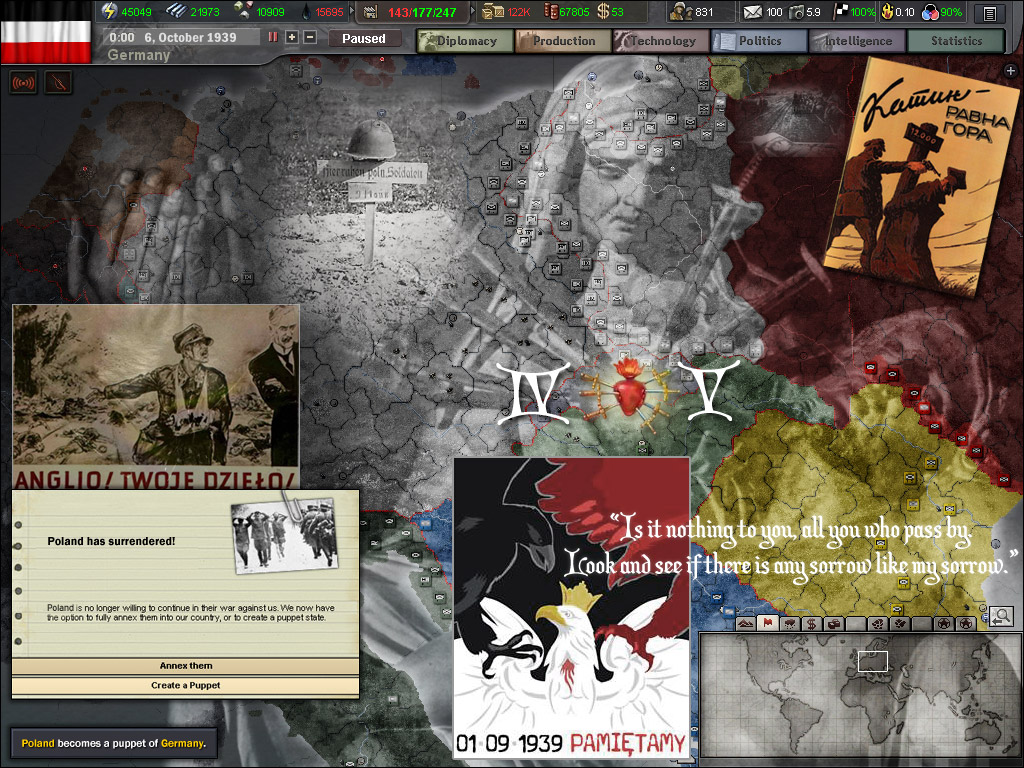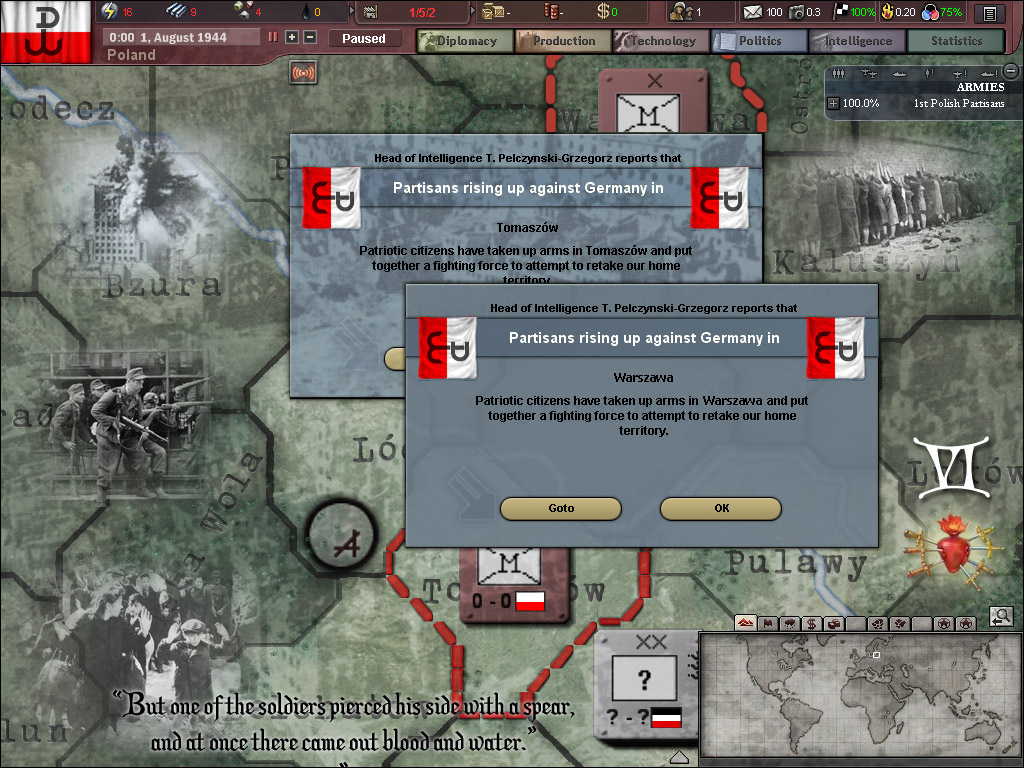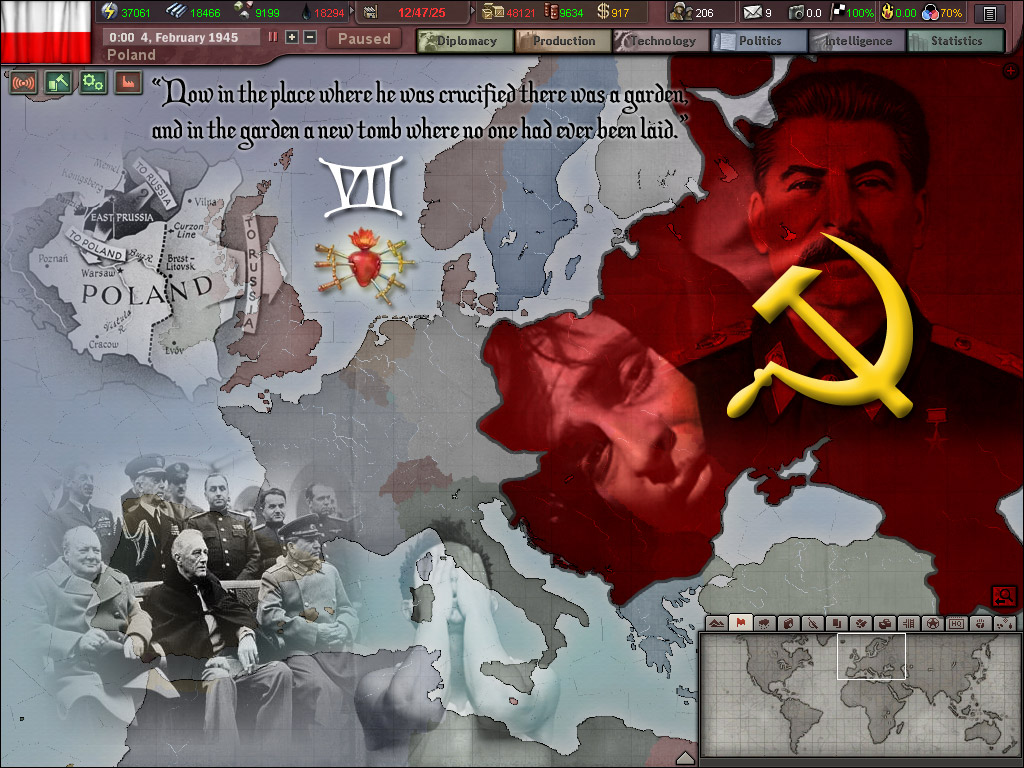Memories

Blood dripped onto the cold, concrete floor. Being interrogated by Soviet secret police was no laughing matter. Marcin Kowalczyk had been an officer in the Polish Army before the war as well as a member of a Polish partisan group. But it wasn’t a communist partisan group which the Soviet occupiers that were beating him to death did not appreciate. The pain kept him awake. But all he wanted to do was to go to sleep. Lie down in a verdant meadow somewhere, close his eyes and fall asleep while listening to the sounds of larks flying over the countryside.
He would probably never experience that again. His life was slowly flowing from his body as if his life force was unwilling to undergo more torture. A heavy set Russian entered the room. It wasn’t the same man as before. This one looked more dangerous. He looked as if he wanted to torture Marcin to death just for the fun of it.
A crackling punch hit Marcin right in the face, breaking his nose. The little blood he had left poured out of his nostrils. The former soldier felt like he was going to black out soon. His vision was blurred, his ears were ringing. And then the memories came…
Marcin Kowalczyk was born in 1916, during the First World War. Growing up in the small village of Sułów, in central Poland, he spent his childhood and teens working on his father’s farm. As tensions rose in the Europe of the 1930s, Kowalczyk joined the Polish Army. He worked his way up to the rank of corporal before the war broke out and was stationed near the German border. When the war eventually did break out, the young, 23-year old Corporal Kowalczyk was in the thick of it. This period of his life he remembered the most vividly.
 One by one, the countries around Germany had fallen. In 1938 it was Austria. A year later, Czechoslovakia was split up and absorbed into the Hitler’s Germany. Poland would be next, no-one doubted that. It was not a question of if, but when.
One by one, the countries around Germany had fallen. In 1938 it was Austria. A year later, Czechoslovakia was split up and absorbed into the Hitler’s Germany. Poland would be next, no-one doubted that. It was not a question of if, but when.
Great Britain and France had promised to come to Poland’s aid but in the end they would not. The Polish were left on their own against the Germans. They would be the first to fight, but they would pay a high price.
 “WE HAVE TO GET OUT OF HERE!” Corporal Kowalczyck screamed into the ear of his sergeant. “WE HAVE TO STAND FAST!” the sergeant replied. “WE HAVE TO PULL BACK OTHERWISE WE’RE DEAD,” Marcin screamed once more. The sergeant, a grizzled man in his thirties, looked around at the utter devastation around him. The small town they were defending had been almost completely leveled by German shells. Polish cavalry units were retreating through the shot up streets. Germans could be seen advancing on their position from all sides. The sergeant looked at Kowalczyck and nodded. They got up and ran out of the building, weaving in and out of cover. They eventually reached the safety of a nearby alleyway were they caught up with the rest of the unit. “Germans!” one of the soldiers whispered sharply. They quickly took cover as German soldiers passed the alleyway. Marcin’s popped his head around the corner. Everything was clear. “Let’s go!” ordered the sergeant.
“WE HAVE TO GET OUT OF HERE!” Corporal Kowalczyck screamed into the ear of his sergeant. “WE HAVE TO STAND FAST!” the sergeant replied. “WE HAVE TO PULL BACK OTHERWISE WE’RE DEAD,” Marcin screamed once more. The sergeant, a grizzled man in his thirties, looked around at the utter devastation around him. The small town they were defending had been almost completely leveled by German shells. Polish cavalry units were retreating through the shot up streets. Germans could be seen advancing on their position from all sides. The sergeant looked at Kowalczyck and nodded. They got up and ran out of the building, weaving in and out of cover. They eventually reached the safety of a nearby alleyway were they caught up with the rest of the unit. “Germans!” one of the soldiers whispered sharply. They quickly took cover as German soldiers passed the alleyway. Marcin’s popped his head around the corner. Everything was clear. “Let’s go!” ordered the sergeant.
Marcin and his unit eventually made it back to their lines and joined the slow defeat across the Polish countryside. The German were attacking from all sides and nowhere was the Polish army holding. All they could do was to retreat as slowly as possible.
 More than two weeks later, the Polish were once again stabbed in the back, this time by the Soviets. In a daring diplomatic move they had made a secret alliance with the Germans to divide Poland. Not having expected such a maneuver, the Polish Army now had to fight a two-front war they were not prepared for. Before the eyes of the world the army collapsed and started retreating to the Romanian border to reorganize. Isolated pockets kept fighting on until early October while the rest of the country was swiftly taken by German and Soviet troops.
More than two weeks later, the Polish were once again stabbed in the back, this time by the Soviets. In a daring diplomatic move they had made a secret alliance with the Germans to divide Poland. Not having expected such a maneuver, the Polish Army now had to fight a two-front war they were not prepared for. Before the eyes of the world the army collapsed and started retreating to the Romanian border to reorganize. Isolated pockets kept fighting on until early October while the rest of the country was swiftly taken by German and Soviet troops.
After five weeks the curtain finally fell for Poland in a speedy war that shocked the world. Germany and the Soviet Union divided the spoils of war. Western Poland became subject to cruel German occupation while the same happened with the Soviets in Eastern Poland. Marcin and his fellow soldiers joined the partisans that operated from the forests and towns of central Poland. They often had to watch as the Germans raped their land. Too few and with little equipment they were forced to stand by and watch. Afterwards they helped all they could but often there was very little they could do.
There had been one day that they had been able to do something. Marcin and his band of partisans were trekking through the forest, dressed in peasants clothes when they saw smoke billowing up. As quickly as they could they made their way to the scene. It was an isolated farm, situated in an otherwise idyllic surrounding. The barn was on fire and Marcin could see two German half tracks unloading troops. A Polish family was kneeling in front of their house, surrounded by German soldiers. Marcin recognized the family. The farmer was an old friend of his father's. He felt he could not just abandon them.
 He turned to his fellow partisans and said: "We've got to do something!" "Are you crazy," another replied. "There's almost two dozen soldiers and only five of us." Their attention was drawn back to the direction of the farm when they heard a German officer shouting at the farmer and his family. "They're going to kill them," said Marcin. "We have to do something!"
He turned to his fellow partisans and said: "We've got to do something!" "Are you crazy," another replied. "There's almost two dozen soldiers and only five of us." Their attention was drawn back to the direction of the farm when they heard a German officer shouting at the farmer and his family. "They're going to kill them," said Marcin. "We have to do something!"
When the other partisans saw the look in his eyes they saw a man determined to follow through no matter what. They could not let him go at the Germans alone. "Alright then," said Marcin. "We have the element of surprise and we have our machine gun," he continued while pointing at the Browning Automatic Rifle. "We need to make them think there are more of us. Stanislaw, Oskar, circle around. It's your job to take out the Germans around the family. We'll fire the first shot." The two scurried off into the forest while Marcin continued: "The machine gun needs to take out the group of soldiers at the halftracks. I'll take out the officer."
Everyone got into position. Marcin looked along the sights until he had the officer in his sights. He fired, the officers head exploded in a orgy of blood. Milliseconds later the rest of the group opened fire on the Germans. Within a second or two half the soldiers had already fallen. The peasant family quickly ran inside away from all the bloodshed. The Germans took cover behind the halftracks and started returning fire. Although they had taken out a lot of them the Germans still outnumbered them. Marcin took out his only grenade and threw it in the direction of the halftrack. A few seconds later the explosion tossed several Germans into the air.
"MOVE IN!" yelled Marcin while he got up. They all ran as quickly across the open terrain. Marcin shot another German but not before he could shoot Adam, the machine gunner. The partisans encircled the halftracks and the two remaining Germans suddenly came out with their hands up. Without pardon Marcin shot them both in the chest...
The memories were getting fainter. His eyes got darker. His face was on the cold, concrete floor. Yet he could feel the warmth of the sun and the tickle of the grass on his skin. He was lieing in a verdant meadow. He could hear the larks flying above.


Blood dripped onto the cold, concrete floor. Being interrogated by Soviet secret police was no laughing matter. Marcin Kowalczyk had been an officer in the Polish Army before the war as well as a member of a Polish partisan group. But it wasn’t a communist partisan group which the Soviet occupiers that were beating him to death did not appreciate. The pain kept him awake. But all he wanted to do was to go to sleep. Lie down in a verdant meadow somewhere, close his eyes and fall asleep while listening to the sounds of larks flying over the countryside.
He would probably never experience that again. His life was slowly flowing from his body as if his life force was unwilling to undergo more torture. A heavy set Russian entered the room. It wasn’t the same man as before. This one looked more dangerous. He looked as if he wanted to torture Marcin to death just for the fun of it.
A crackling punch hit Marcin right in the face, breaking his nose. The little blood he had left poured out of his nostrils. The former soldier felt like he was going to black out soon. His vision was blurred, his ears were ringing. And then the memories came…
Marcin Kowalczyk was born in 1916, during the First World War. Growing up in the small village of Sułów, in central Poland, he spent his childhood and teens working on his father’s farm. As tensions rose in the Europe of the 1930s, Kowalczyk joined the Polish Army. He worked his way up to the rank of corporal before the war broke out and was stationed near the German border. When the war eventually did break out, the young, 23-year old Corporal Kowalczyk was in the thick of it. This period of his life he remembered the most vividly.

Great Britain and France had promised to come to Poland’s aid but in the end they would not. The Polish were left on their own against the Germans. They would be the first to fight, but they would pay a high price.

Marcin and his unit eventually made it back to their lines and joined the slow defeat across the Polish countryside. The German were attacking from all sides and nowhere was the Polish army holding. All they could do was to retreat as slowly as possible.

After five weeks the curtain finally fell for Poland in a speedy war that shocked the world. Germany and the Soviet Union divided the spoils of war. Western Poland became subject to cruel German occupation while the same happened with the Soviets in Eastern Poland. Marcin and his fellow soldiers joined the partisans that operated from the forests and towns of central Poland. They often had to watch as the Germans raped their land. Too few and with little equipment they were forced to stand by and watch. Afterwards they helped all they could but often there was very little they could do.
There had been one day that they had been able to do something. Marcin and his band of partisans were trekking through the forest, dressed in peasants clothes when they saw smoke billowing up. As quickly as they could they made their way to the scene. It was an isolated farm, situated in an otherwise idyllic surrounding. The barn was on fire and Marcin could see two German half tracks unloading troops. A Polish family was kneeling in front of their house, surrounded by German soldiers. Marcin recognized the family. The farmer was an old friend of his father's. He felt he could not just abandon them.

When the other partisans saw the look in his eyes they saw a man determined to follow through no matter what. They could not let him go at the Germans alone. "Alright then," said Marcin. "We have the element of surprise and we have our machine gun," he continued while pointing at the Browning Automatic Rifle. "We need to make them think there are more of us. Stanislaw, Oskar, circle around. It's your job to take out the Germans around the family. We'll fire the first shot." The two scurried off into the forest while Marcin continued: "The machine gun needs to take out the group of soldiers at the halftracks. I'll take out the officer."
Everyone got into position. Marcin looked along the sights until he had the officer in his sights. He fired, the officers head exploded in a orgy of blood. Milliseconds later the rest of the group opened fire on the Germans. Within a second or two half the soldiers had already fallen. The peasant family quickly ran inside away from all the bloodshed. The Germans took cover behind the halftracks and started returning fire. Although they had taken out a lot of them the Germans still outnumbered them. Marcin took out his only grenade and threw it in the direction of the halftrack. A few seconds later the explosion tossed several Germans into the air.
"MOVE IN!" yelled Marcin while he got up. They all ran as quickly across the open terrain. Marcin shot another German but not before he could shoot Adam, the machine gunner. The partisans encircled the halftracks and the two remaining Germans suddenly came out with their hands up. Without pardon Marcin shot them both in the chest...
The memories were getting fainter. His eyes got darker. His face was on the cold, concrete floor. Yet he could feel the warmth of the sun and the tickle of the grass on his skin. He was lieing in a verdant meadow. He could hear the larks flying above.

Last edited:
















